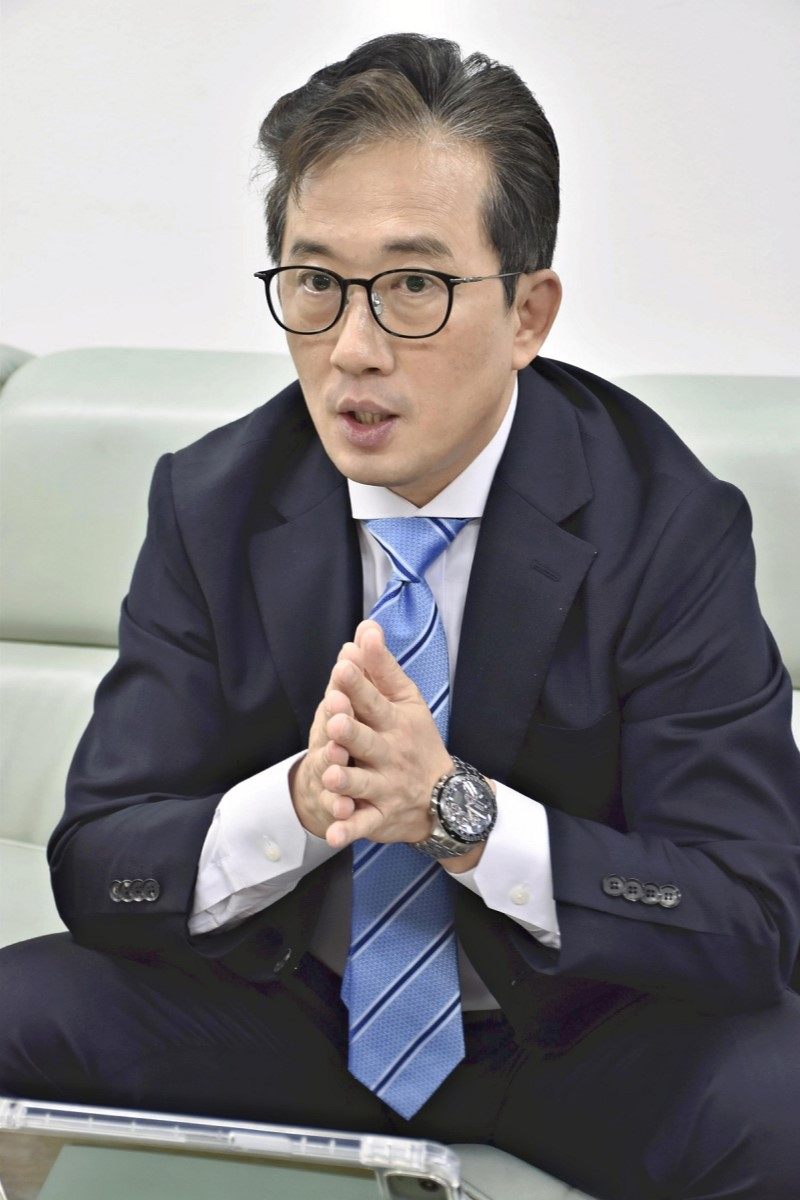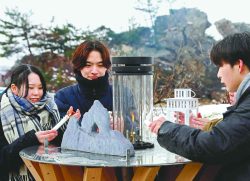Ex-DPRK Diplomat Criticizes Pyongyang Over Nuclear Program; Defector Says North Koreans Resent Leader’s Luxurious Life

Ri Il Gyu speaks during an interview with The Yomiuri Shimbun in Seoul on Oct. 2.
16:03 JST, October 9, 2024
SEOUL — A former North Korean diplomat who defected to South Korea last November has sharply criticized Pyongyang for developing nuclear arms at the expense of its people.
“I was ashamed to be a North Korean diplomat,” Ri Il Gyu said during an interview with The Yomiuri Shimbun in Seoul on Oct. 2. Ri, 52, is a former political affairs counselor at the North Korean Embassy in Cuba.
He is the second-highest ranking North Korean diplomat to have defected after Tae Yong Ho, a former North Korean deputy ambassador to the United Kingdom. This is the first time Ri has given an interview to a Japanese media outlet.
When a high-ranking Cuban official visited North Korea in 2018, Ri met with North Korean leader Kim Jong Un, who directly asked him questions.
“I didn’t have a bad impression of him [Kim]. I don’t hate him personally, but his actions are ugly,” Ri said.
Ri accused Kim of subjecting the North Korean people to starvation while he lives a life of luxury. “The dictatorship must collapse. If he thinks it will last forever, he’s making a big mistake,” Ri said harshly.
North Korean people developed a feeling of rejection when they saw a girl who is believed to be Kim Jong Un’s daughter, Kim Ju Ae, wearing expensive clothes and receiving salutes from senior officials when she accompanied him on an inspection tour, Ri said.
The former diplomat said he initially felt proud of the country’s nuclear development, but later realized that people’s lives continued to deteriorate even years after the first nuclear test in 2006.
“The people saw that the nuclear weapons were meant to protect the Kim family,” Ri said. “What people want is food for one meal. They turned their backs on Kim Jong Un,” he said.
Loyalty disappeared
There are two types of North Korean diplomats, Ri said. One is the legitimate diplomats sent by the Foreign Ministry or the External Economic Relations Ministry, as well as resident military officials sent by the Defense Ministry. The other is the “unofficial diplomats” who are involved in nuclear weapons production and fundraising.
There were also people at the Cuban Embassy who were in charge of raising money for the nuclear program. They had diplomatic passports, but the Foreign Ministry officials, including the ambassador, were not informed about the details of their work, Ri said.
“[North Korea] does many things that even we find disgusting, but we had to protect that system. How can that possibly lead to pride or loyalty?” he said.
Ri said his monthly salary in Cuba was $500 (about ¥73,000). To make ends meet, he smuggled Cuban cigars.
North Korean diplomats are just like children wearing neckties who live on the streets because they do not get paid enough for the work they do, Ri said.
North Korean diplomats have been met with cold looks overseas, but South Korean diplomats have been welcomed. “I wanted to tell them many times that I was from the South,” Ri said.
He told his wife and child of his plan to defect six hours before he carried it out. He recalled that the hour before boarding the plane at the airport in Cuba in the early morning “felt like 10 years … I checked my watch a hundred times.”
He sent a message to his former colleagues at the North Korean Foreign Ministry, saying, “If it is difficult to make changes from within, I hope you will leave the country and live your only life as a human being.”
Preparing for negotiations
Regarding the U.S. presidential election in November, Ri believes Kim Jong Un wants former U.S. President Donald Trump to be reelected because the United States may be more interested in North Korea than it has been with the Democrats in power.
The “close ties” between Kim and Trump have been publicized in North Korea. Ri predicted that if Trump were reelected, it would also strengthen Kim’s leadership.
Kim sent a telegram to former Prime Minister Fumio Kishida in January to express his condolences over the damage caused by the Noto Peninsula Earthquake. Ri believes this was a message that North Korea is ready to deal with the issue of the abduction of Japanese nationals by North Korean agents.
North Korea later released an unofficial statement by Kim Jong Un’s sister, Kim Yo Jong, in which she referred to North Korea’s position that the abduction issue had already been resolved. Kim Yo Jong serves as a deputy director of the Central Committee of the Workers’ Party of Korea.
Ri believes she dared to raise the issue because she was trying to boost expectations in Japan.
Ri thinks that North Korea had judged that the Kishida administration was close to ending, and thus negotiations did not progress, but that North Korea would explore how the administration of Prime Minister Shigeru Ishiba would approach Pyongyang.

Ri Il Gyu
After graduating from Pyongyang University of Foreign Studies, he joined the Foreign Ministry in 1999. He worked at the North Korean Embassy in Cuba from 2011 to 2016 and from 2019 to 2023. An expert on Central and South America, he served as the deputy director general in charge of the region. He also received an award from Kim Jong Un.
Top Articles in World
-

China Confirmed to Be Operating Drilling Vessel Near Japan-China Median Line
-

China Eyes Rare Earth Foothold in Malaysia to Maintain Dominance, Counter Japan, U.S.
-

Japan, Qatar Ministers Agree on Need for Stable Energy Supplies; Motegi, Qatari Prime Minister Al-Thani Affirm Commitment to Cooperation
-

North Korea Possibly Launches Ballistic Missile
-

10 Universities in Japan, South Korea, Mongolia to Establish Academic Community to Promote ICC Activities, Rule of Law
JN ACCESS RANKING
-

Univ. in Japan, Tokyo-Based Startup to Develop Satellite for Disaster Prevention Measures, Bears
-

JAL, ANA Cancel Flights During 3-day Holiday Weekend due to Blizzard
-

China Confirmed to Be Operating Drilling Vessel Near Japan-China Median Line
-

China Eyes Rare Earth Foothold in Malaysia to Maintain Dominance, Counter Japan, U.S.
-

Japan, Qatar Ministers Agree on Need for Stable Energy Supplies; Motegi, Qatari Prime Minister Al-Thani Affirm Commitment to Cooperation






















